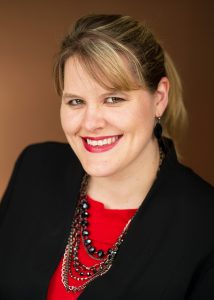By Adam Stone

For Danielle Roland, J.D. ’12, working as in-house counsel means tackling big-picture questions. As general counsel at Michigan-based ANDRITZ Schuler North America, she evaluates risk in everything from hiring practices to leases on buildings, always with an eye toward the company’s overall strategic ambitions.
“It’s about being involved in the strategy and the goals of the company, knowing: What’s our plan 10 years down the road?” she says. By understanding that big picture, “I can then give direction and legal guidance.”
Law firms draw the lion’s share of lawyers– over 445,000, according to the most recent data from the Association of Corporate Counsel. But there are other paths: Over 140,000 lawyers work as in-house counsel. UBalt Law graduates who go the in-house route say the job is both complex and highly satisfying. They often are deeply embedded — not just in a company’s legal work, but in its strategic decision-making.
An evolving role

The work of in-house counsel has increasingly focused on business leadership in recent years. Today the job is “strategic in nature,” says Cory Myers, J.D. ’07, associate general counsel for intellectual property at KPMG in Washington, D.C. In his case, “that can include strategic thoughts about investments in particular technologies and developing an IP portfolio around that.”
The job involves “working with the business team leaders to understand what makes the business tick, then making sure we’re developing legal strategy in accordance with those business goals,” he says.
Roland became ANDRITZ Schuler North America’s first in-house general counsel nine years ago. “When I started, it was mostly reviewing contracts, helping with sales orders. It was very transactional,” she says.
That has changed over time. “It’s really become more of a strategic role,” she says. That includes “being proactive on risk management, being involved with the board of directors and planning for the company’s growth and success.”
To deliver in such a role, “you really have to know a little bit about a lot of things,” says James Beslity, J.D. ’19, who serves as corporate counsel at HomeServices of America and its largest operating company, The Long & Foster Companies.
“I routinely am engaged not just in traditional real estate-related matters, but employment, various types of litigation, intellectual property, transactional work,” he says. “Practically speaking, you need to be able to do it all.”
Challenges and rewards
The increasingly wide-ranging role of in-house counsel comes with unique challenges and rewards.
There are challenges when it comes to the actual lawyering. When you’re in house, “they never want to hear you say, ‘No, you can’t do that,’” Roland says. “Outside counsel can say that: ‘Hey, this is way too risky, you shouldn’t do that.’”
As in-house counsel, “they want to figure out how we can do this,” she says. “The challenge is to figure out how can we do it, but in the best way possible for the company.”

Beslity, meanwhile, finds himself juggling multiple non-lawyerly responsibilities. “I manage my own mail and my calendar,” he says. “Many companies these days are reducing headcount, trying to make the most of the resources they have. If you’re capable of handling administrative tasks — what some in the legal profession might consider grunt work — you’re doing it.”
But the rewards can make it worth it.
“When you’re in private practice, you’re working based on what the client may have as an immediate priority, and you can be working on a singular thing for months,” without ever getting to be part of the bigger picture, Myers says. As in-house, “I really enjoy seeing the full scope of a project.”
Roland likewise takes satisfaction in the big-picture nature of her role. As in-house counsel, “you have an integral role in shaping the company and where it’s going,” she says.
For Beslity, the breadth of tasks gives him a chance not just to utilize his legal skills, but also to build real relationships. As in-house counsel, “you have to be a people person,” he says. “I’m in my office right now and the marketing team is down the hall, the accounting team is down the hall, and I can see Long and Foster’s CEO’s office from here. My clients are sitting all around me.”
Making the transition
Why go in-house? For Myers, who started out in a law firm, it was largely a lifestyle choice. In-house work “is different in terms of the work-life balance,” he says. “It’s still a ton of work, but you have a little bit more ability to control your schedule in an in-house role, which was good for me. I had younger kids at the time, so that was appealing to me.”
For those looking to make the leap, there are multiple pathways from private practice to an in-house opportunity.
Roland, for example, had previously worked at a law firm, setting up corporations and advising clients on business issues. With that background in transactional corporate work, going in-house “wasn’t a huge change for me,” she says. “It wasn’t like I was coming from medical malpractice litigation.”
Hand-on experience while at UBalt Law helped as well. “One of the things the law school does so well is their practical learning experience,” she says. “I did two internships while I was there, and that gave me such great practical experience, along with having so many faculty members who were practicing attorneys. All that made a big difference for my work, my career.”
Beslity, meanwhile, had also left a law firm and was looking to start his next chapter when he took his first in-house position, as associate counsel with Maryland REALTORS®. With a background in real estate law, “it just seemed like the perfect opportunity,” he says.
It felt like a leap of faith to leave the conventional litigation track, he says. “But honestly, at this point, this is my dream job.”
He encourages law students to get involved early, if they’re interested in an in-house career. “Get out there and find those practical experiences,” he says, noting that UBalt Law can help to make that happen.
“The Law Career Development Office is probably my favorite entity within the law school,” he says. “They do incredible work, really encouraging students to get out there and find those practical experiences.”
Adam Stone is a writer based in Annapolis.
